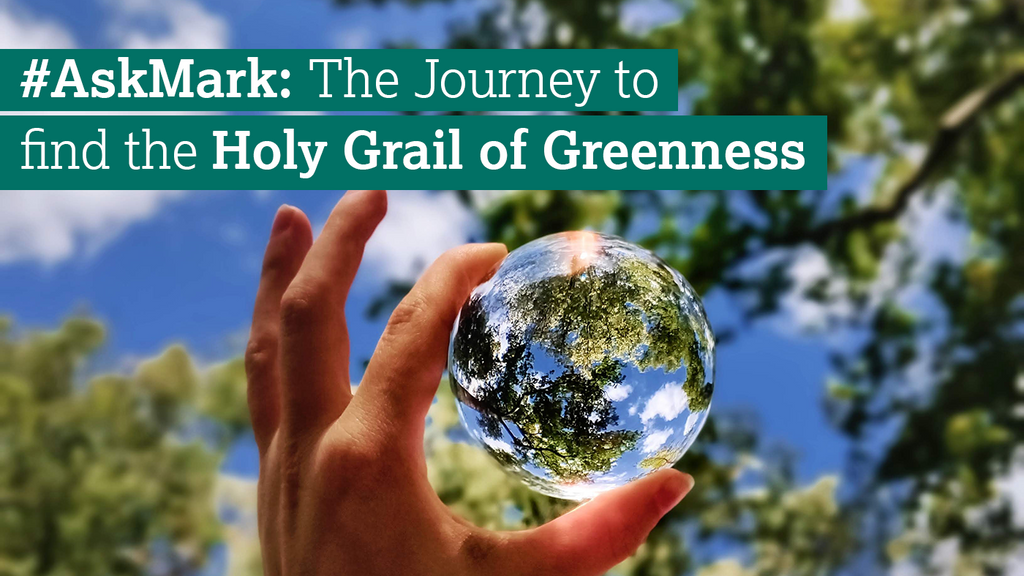#AskMark – the journey to find the holy grail of greenness

Dressed for work in a suit and a tie, I’m probably the last bloke you’d consider to be an eco-warrior.
But the longer I am involved in the world of environmentally conscious manufacturing, the more I realise that there is a real fight to get involved in. And it is time that everyone picks a side!
Down at the frontline of the war on waste, it is a dark and dispiriting place. And as with all battles, the picture is confusing and difficult to explain. But I’ll try here, using my experience as a guide.
At Delphis Eco, I’ve made a point of trying to do the right thing from the off. Producing cleaning products without chemical nasties was always going to be a challenge simply because the industry wasn’t set up for it. But developing recipes that suppliers could work with was just the starting point.
My interest in green products really grew during my former life in banking and ethical investment. Seeing pictures of mountains of plastic waste in poverty-stricken Third World countries was a particular eye-opener that made me question the traditional thinking of capitalism’s industrial model – the destructive linear economy of ‘Take-Make-Waste’.
So, as well as all the other challenges of starting a business, ensuring our products were packaged the right way has always been important.
We wanted plastic bottles that were 100% recycled, so off we went, chasing waste collectors, rubbish dumps and plastic suppliers only to be told our dream wasn’t possible. When we did find a small business that was recycling London’s plastic milk bottles – and was able to help us – they rather inconveniently went bust.
Still, out of adversity came an even stronger desire to succeed. And if milk bottles were the way forward, it presented another opportunity – to reuse ‘home-grown’ waste products, rather than plastics that had been sent halfway around the world to be processed before coming back. In the circular economy, keeping this production in the UK was the holy grail of ‘greenness’.
Of course, waste collection firms thought we were mad, but when they realised we were serious they agreed to separate used milk bottles for us. The same too for our bottle blower, who initially insisted this plastic wasn’t of good enough quality to go into their plant and needed lots of convincing. There was some complicated science too (all to do with molecule length, in case you’re interested!) but we overcame that by making our bottles slightly thicker. Sure, they are slightly heavier as a result, but UK recycling and manufacture means zero carbon miles, which far outweighs the emissions cost of importing recycled raw materials from China.
At the same time, our supplier is now getting considerable interest from a whole host of other manufacturers about their 100% recycled plastic, opening up the prospect of new jobs and new investment. And as more potential customers make the switch, the processing should get cheaper meaning better prices for all of us.
So there has been some interesting learning on this journey. First off is perseverance. When it comes to the environment, you encounter plenty of ‘old world’ thinking. Asking to do new stuff in different ways will typically be met with a shake of a head or sharp intake of breath, so the secret is to have a thick skin and a total belief that you are doing the right thing. We’ve pushed boundaries and changed opinions by convincing suppliers to work with us – mostly by paying more than to get the technology up and running and shown them why it will be financially beneficial for us all in the long run.
Secondly, and on a rather more depressing note, is the fact that the whole recycling arena is one of smoke and mirrors. The present packaging waste regulations essentially incentivise companies to watch plastic waste be exported to poorer nations for recycling. Given the UK is fast running out of landfill capacity, it’s no surprise the government is happy to see plastic sent abroad, but we are not fooling anyone if we think recycling facilities in Indonesia, Vietnam or India are more efficient than here. Thousands of miles away, mountains of rubbish are building up – and being burned – so we don’t have to deal with the problem.
Meanwhile, consumers should be similarly concerned about the dutiful recycling they do at home. Separating your rubbish is all very well, but in some London Boroughs a staggering 82% of those recyclables are currently being incinerated rather than reused.
Where do we go from here then? For us, it’s about ensuring that every business partner we work with buys in to our eco vision and is committed to joining us to be carbon neutral by 2030. We’re also among the founding signatories to the Ellen McArthur Foundation’s Plastic Pact, which is working towards a true circular economy for plastic products.
Ultimately, I’d like to see the introduction of a proper kitemark system that consumers can trust when it comes to plastic products made from recycled materials. We’ve seen how demand (from Delphis Eco) pushed manufacturers to try new things, so imagine this pressure multiplied across the country. If we can do it with old milk bottles then what about other types of plastic too? The pendulum of public opinion is swinging, and it’s up to business to meet the challenge.

Leave a comment